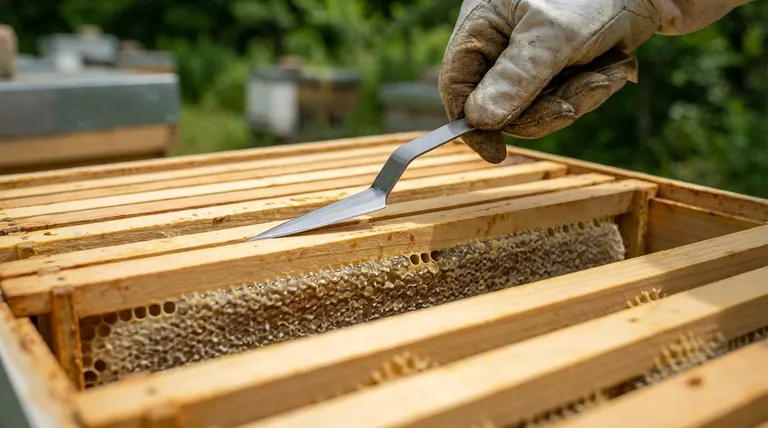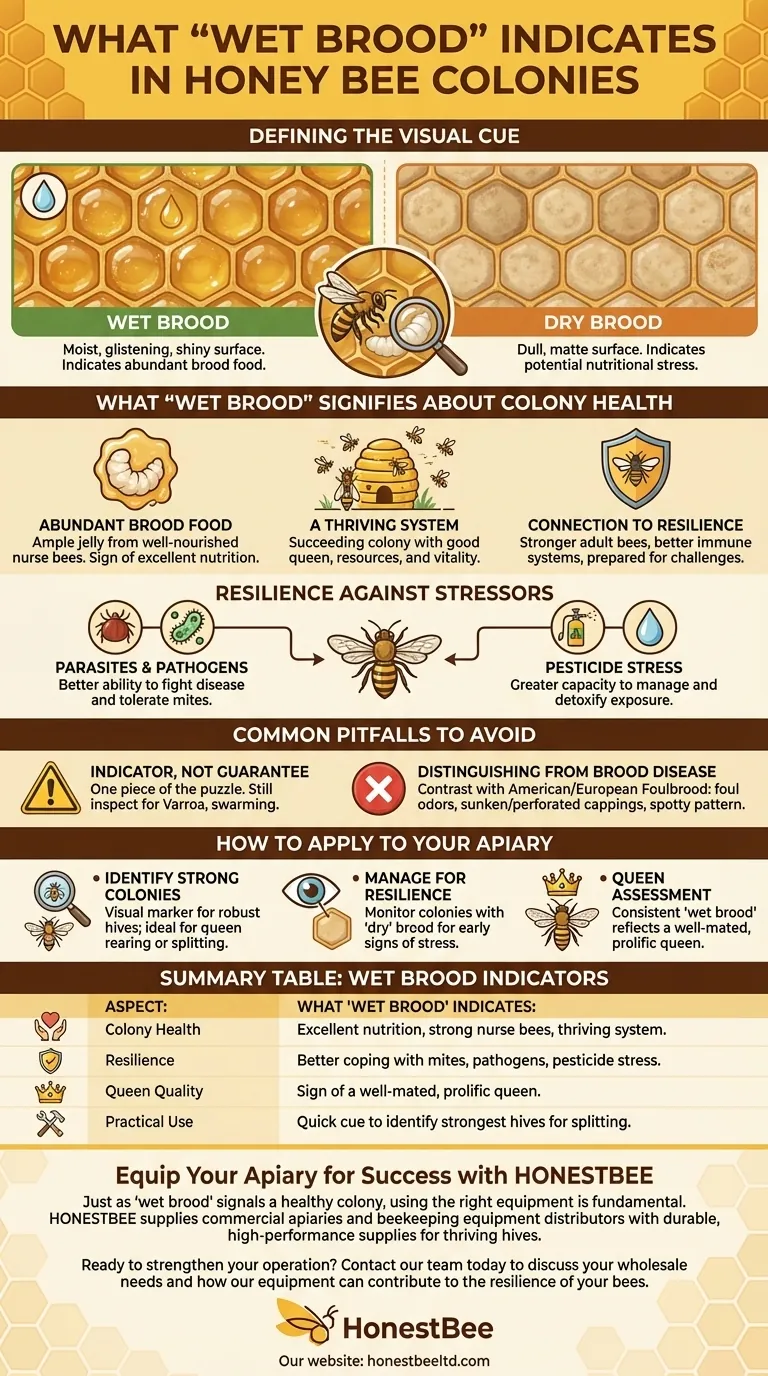The key practical application of observing 'wet brood' in a honey bee colony is to use it as a visual indicator of overall colony health and vigor. Colonies exhibiting this trait are considered to be thriving and are likely more resilient against common stressors like parasites, pathogens, and pesticides.
Observing 'wet brood' is not just a minor detail; it is a direct visual cue that a colony's internal nutritional system is functioning at a high level. This allows beekeepers to quickly identify their most robust hives, which are better equipped to survive environmental challenges.

What 'Wet Brood' Signifies About Colony Health
Defining the Visual Cue
'Wet brood' refers to the appearance of capped brood cells that have a moist, glistening, or shiny surface. This is in contrast to 'dry brood,' where the cappings appear dull and matte.
This visual difference is subtle but points to a significant difference in the colony's internal condition.
The Link to Abundant Brood Food
The "wet" appearance is believed to be caused by the ample quantity of brood food, or jelly, that nurse bees feed to the larvae before capping the cell.
A generous, wet-looking capping suggests that the colony's nurse bees are well-nourished and producing a surplus of high-quality food. This is a direct sign of excellent nutrition and a strong, healthy nurse bee population.
An Indicator of a Thriving System
A colony that can afford to generously feed its young is one that is succeeding.
The presence of wet brood indicates that the colony has a good queen, sufficient pollen and nectar resources, and the overall vitality to invest heavily in the next generation of bees.
The Connection to Colony Resilience
Coping with Parasites and Pathogens
Well-nourished larvae develop into stronger, healthier adult bees.
These bees have more robust immune systems and are physiologically better prepared to fight off diseases and tolerate the effects of parasites like the Varroa mite. Good nutrition is a cornerstone of disease resistance.
Mitigating Pesticide Stress
While not a complete shield, a fundamentally healthier and better-fed colony has a greater capacity to manage and detoxify from sublethal pesticide exposure.
Strong internal health provides a buffer that can help the colony withstand the metabolic stress imposed by environmental contaminants.
Common Pitfalls to Avoid
It's an Indicator, Not a Guarantee
'Wet brood' is a strong positive signal, but it should be considered as one piece of the puzzle.
A colony can still face other challenges, such as a high Varroa mite load or preparations for swarming, that require a full and proper inspection. Do not let this one sign prevent you from completing a thorough assessment.
Distinguishing from Brood Disease
It is critical to differentiate the healthy, uniform shine of 'wet brood' from the symptoms of brood diseases.
Conditions like American Foulbrood (AFB) or European Foulbrood (EFB) can also create a moist or discolored appearance. However, these are accompanied by negative signs like foul odors, sunken or perforated cappings, and a spotty brood pattern.
How to Apply This to Your Apiary
Using the presence of 'wet brood' as a visual cue can help streamline your colony assessments and inform your apiary management decisions.
- If your primary focus is identifying strong colonies: Use 'wet brood' as a quick visual marker to flag your most robust hives, which are ideal candidates for queen rearing or splitting.
- If your primary focus is managing for resilience: Pay closer attention to colonies with consistently 'dry' brood, as they may be the first to show signs of nutritional stress or other underlying problems.
- If your primary focus is queen assessment: View consistently 'wet brood' across the frames as a positive reflection of a well-mated, prolific queen and the strong nurse bee population that supports her.
Ultimately, recognizing the subtle sign of 'wet brood' transforms a simple observation into a powerful assessment of a colony's underlying strength and potential.
Summary Table:
| Aspect | What 'Wet Brood' Indicates |
|---|---|
| Colony Health | Excellent nutrition, strong nurse bee population, and a thriving internal system. |
| Resilience | Better ability to cope with Varroa mites, pathogens, and pesticide stress. |
| Queen Quality | A sign of a well-mated, prolific queen supported by a healthy colony. |
| Practical Use | A quick visual cue to identify your strongest hives for splitting or queen rearing. |
Equip Your Apiary for Success with HONESTBEE
Just as 'wet brood' signals a healthy colony, using the right equipment is fundamental to building and maintaining that strength. HONESTBEE supplies commercial apiaries and beekeeping equipment distributors with the durable, high-performance supplies needed to support thriving hives.
From robust hive bodies to precise feeding systems, our wholesale-focused operations ensure you get the reliable gear that supports the vital signs of colony health.
Ready to strengthen your operation? Contact our team today to discuss your wholesale needs and how our equipment can contribute to the resilience of your bees.
Visual Guide

Related Products
- HONESTBEE Professional Long Handled Hive Tool with Precision Cutting Blade
- HONESTBEE Advanced Ergonomic Stainless Steel Hive Tool for Beekeeping
- Professional Dual-End Stainless Steel Hive Tool for Beekeeping
- Long Langstroth Style Horizontal Top Bar Hive for Wholesale
- Honey Flow Garden Bee Hive Flow Hive Best Beehive for Beginners
People Also Ask
- Why use professional beekeeping tools for beehive inspections? Crucial Support for Pollinator Protection Policies
- What are the difficulties of conducting a beehive inspection without a hive tool? Avoid Propolis and Colony Stress
- What are the core process advantages of professional hive-making machinery? Scaling Commercial Apiaries with Precision
- What are the basic tools for beekeeping? Essential Starter Kit for Safe & Successful Hive Management
- What is the operational mechanism of a beehive smoker? Master Bee Calm and Safety During Harvesting



















